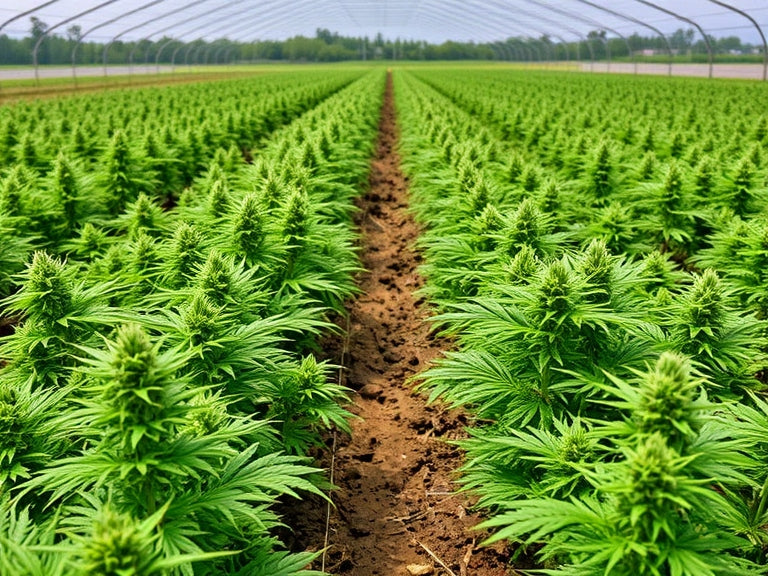
Environmental Impact of Cannabis Farming: Sustainable Choices
by Dexter Cann
·
As cannabis continues its transition from a stigmatized substance to a widely accepted product for medicinal and recreational use, the industry’s environmental footprint is drawing increasing attention. From water usage to energy consumption and waste management, cannabis farming has significant implications for the environment. In this article, we’ll explore these impacts and provide actionable tips on how consumers and growers alike can make more sustainable choices to support a greener future for the cannabis industry.
The Environmental Costs of Cannabis Cultivation
1. Water Usage
Cannabis plants are notoriously thirsty, requiring considerable water resources to thrive. Outdoor cannabis cultivation can consume up to 22 liters (nearly six gallons) of water per plant per day during peak growing periods. This demand often places strain on local water supplies, particularly in drought-prone regions.
Solution:
-
Growers can adopt water-saving techniques such as drip irrigation systems, rainwater harvesting, and scheduling watering during cooler parts of the day to reduce evaporation.
-
Consumers can support brands that commit to responsible water management practices.
2. Energy Consumption
Indoor cannabis farming is energy-intensive due to the need for artificial lighting, climate control, and ventilation systems. A study from New Frontier Data revealed that indoor cannabis cultivation in the U.S. accounts for about 1% of the nation’s total electricity consumption.
Solution:
-
Switching to energy-efficient LED grow lights can significantly reduce electricity usage.
-
Solar panels and other renewable energy sources can further offset the environmental cost of indoor cultivation.
3. Chemical Usage and Soil Health
The use of synthetic fertilizers, pesticides, and herbicides can degrade soil quality and contaminate local ecosystems. Improper chemical use also threatens pollinators and beneficial insects, further disrupting the environment.
Solution:
-
Organic farming methods, crop rotation, and integrated pest management (IPM) can minimize chemical use and enhance soil health.
-
Look for cannabis products certified as organic or grown using sustainable agricultural practices.
4. Carbon Emissions
Transportation, packaging, and processing contribute to the carbon footprint of cannabis. The globalized nature of the industry often involves long-distance shipping, which generates significant greenhouse gas emissions.
Solution:
-
Supporting locally-grown cannabis products can help minimize emissions associated with transportation.
-
Consumers can prioritize brands that use biodegradable or recyclable packaging.
5. Waste Management
From plant waste to single-use packaging, cannabis production generates a significant amount of waste. In many cases, these materials end up in landfills, further contributing to environmental degradation.
Solution:
-
Growers can compost organic waste and recycle materials wherever possible.
-
Consumers should choose brands that offer sustainable packaging and participate in recycling programs.
How Consumers Can Drive Change
While growers bear much of the responsibility for implementing sustainable practices, consumers also play a pivotal role in influencing the cannabis industry’s environmental footprint. Here are ways you can contribute:
1. Buy Locally
Local purchases not only reduce transportation emissions but also support smaller, sustainable farmers in your community.
2. Research Growers
Look for companies that are transparent about their sustainability practices. Certifications such as USDA Organic or other eco-labels can help guide your choices.
3. Reduce Waste
Opt for products with minimal or eco-friendly packaging, and consider reusing containers when possible. Avoid single-use plastics whenever you can.
4. Educate Yourself
Understanding the environmental impacts of your cannabis consumption empowers you to make informed decisions. Share your knowledge with others to amplify change.
Innovative Practices Making Cannabis Farming More Sustainable
1. Regenerative Farming
Regenerative agriculture focuses on improving soil health, increasing biodiversity, and capturing carbon in the soil. Techniques like cover cropping, no-till farming, and the use of organic compost are gaining traction in cannabis cultivation.
2. Aquaponics and Hydroponics
These soil-less growing techniques use significantly less water than traditional methods. Aquaponics even integrates fish farming, creating a closed-loop system where fish waste fertilizes the plants.
3. Renewable Energy Integration
Solar, wind, and geothermal energy are increasingly being adopted by cannabis farms to reduce reliance on fossil fuels.
4. Smart Farming Technologies
Technologies like automated irrigation, environmental sensors, and data-driven decision-making help optimize resources, ensuring more efficient and sustainable farming practices.
Why Sustainable Cannabis Farming Matters
The cannabis industry’s environmental impact extends beyond the farm. Poor practices can harm local communities, deplete natural resources, and contribute to global challenges like climate change. Conversely, adopting sustainable methods can:
-
Preserve ecosystems and biodiversity.
-
Reduce the industry’s carbon footprint.
-
Set a positive precedent for other agricultural industries.
As cannabis consumers, we hold significant power to drive the demand for sustainability by making conscious choices.
How Cubbi Stash Boxes Align with Sustainability
At Cubbi, we understand the importance of sustainability in the cannabis lifestyle. Our stash boxes are designed with eco-consciousness in mind, featuring durable materials that promote longevity and reduce waste. By choosing Cubbi, you’re not just storing your cannabis stylishly—you’re also supporting a company committed to environmental responsibility.
Make the Sustainable Choice with Cubbi
Take your cannabis storage to the next level with a Cubbi stash box. Stylish, practical, and eco-friendly, our products are the perfect complement to your sustainable cannabis lifestyle. Browse our collection today and make a positive impact on the environment while keeping your stash secure.